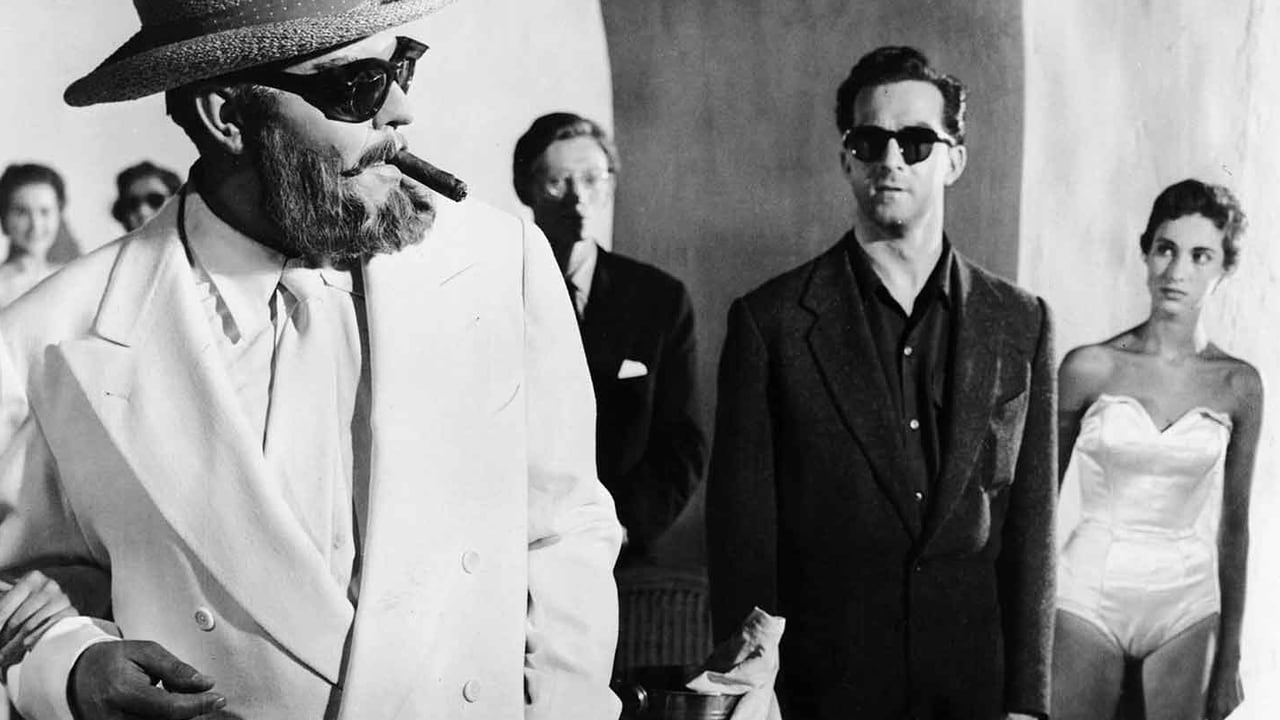



The greatest movie ever made..!
SERIOUSLY. This is what the crap Hollywood still puts out?
View MoreIt is a whirlwind of delight --- attractive actors, stunning couture, spectacular sets and outrageous parties.
View MoreIt's simply great fun, a winsome film and an occasionally over-the-top luxury fantasy that never flags.
View MorePrior to becoming a multimillionaire, the title character was the leader of an infamous gang in pre-WWII Poland. He hires an opportunist-drifter who breaks into his house to find out about his past, saying he has amnesia and can't remember anything, not even his real name.Sound intriguing? You bet. An interesting story? well, semi-interesting. It's festooned with plot holes and poor continuity, sorely in need of an editor. Plus, the main character represents what may be the worst casting job in the long history of Motion Pictures. His name is Robert Arden. Ever hear of him? Thought not. He was, in a word, dreadful. No subtlety, no nuance and wrecked this picture almost singlehandedly.Everybody wants to give Orson Welles and his genius their due. I think that is the main reason for many reviewers overrating this picture, and some of his genius is on display here, in fits and starts. Too often, however, his genius manifests itself in brief outbursts of megalomania as he postures and glowers before the camera in one of his too-frequent close-ups.The supporting cast ranges from excellent to superb, led by Akim Tamiroff and Katina Paxinou, both of whom had too brief appearances before the camera. As I said, there are flashes of brilliance, but not enough to pull this film up to a respectable rating. This is a seriously flawed movie.
View MoreFirstly, some administration issues: like most Orson Welles projects, 'Mr. Arkadin (1955)' suffered from studio interference in post- production, and so there are numerous versions of the film available for public viewing. Among the possible options is the chronologically-cut print released in America, the European cut retitled "Confidential Report," and several versions released by the Criterion Collection that purport to represent, to varying degrees, Welles' original vision. For my first viewing of the film, I watched the version titled "Confidential Report," which can be found on a VHS released by distributor Connoisseur Video. The flashback structure maintained in most prints of the film, including this version, deliberately recalls the American film noir style. Of course, this comes as no surprise – Welles had already released 'The Stranger (1946)' and 'The Lady from Shanghai (1947),' and would soon return to Hollywood (albeit briefly) to direct his archetypal noir, 'Touch of Evil (1958).' But Orson Welles was not one to do things by the book, and 'Mr. Arkadin' is like no American noir you've ever seen.If one must choose a film with which to compare 'Mr. Arkadin,' it would probably be Carol Reed's 'The Third Man (1949).' Both pictures transplant a familiar film noir plot into a European setting, and an eccentric camera captures the personality of the exotic locales and their inhabitants. Both, of course, also starred Orson Welles in a prominent role, and playing analogous characters. In Reed's film, Harry Lime is a smug, boyish racketeer whose thirst for ill-gotten profits takes priority over the faceless victims of his black-market crimes. Gregory Arkadin might be considered an extension of Lime's character, had he emerged unscathed from the Vienna sewers and lived years more. Arkadin is undoubtedly a criminal, but one whose incredible success has pushed him beyond such a characterisation. Despite having apparently eluded his youthful years in petty crime (after erasing his former identity, much as Lime attempted), Arkadin remains plagued by the shame of his past, unwilling to acknowledge that he is just as contemptible now as he ever was.Despite the thematic influence of American cinema, Welles' direction, stylistically, more closely resembles the work of European artists like Federico Fellini. His dynamic camera-work and editing has an air of improvisation, and a certain flamboyance that might seem overindulgent if it weren't so brilliantly effortless. The film's most interesting sequence is an early costume ball in which guests are hidden behind grotesque masks, whose massive features crowd the frame like the creatures from Maurice Sendak's "Where the Wild Things Are." Though it is Welles' presence that dominates the screen, Robert Arden is an intriguing noir protagonist: Guy Van Stratten is a small-time smuggler (once again drawing a parallel with Harry Lime) who epitomises the petty crook that Arkadin once was. Infatuated with nothing but money and self- preservation, Stratten continually exploits the affections of girlfriend Mily (Patricia Medina) and Arkadin's daughter Raina (Paola Mori). He destroys the lives of both women, and, unremorsefully, manages to save his own neck; Gregory Arkadin isn't the only villain on this cluttered continent.
View MoreAfter viewing the "comprehensive" version on DVD I can only marvel at what a mess it is. The Wellesian cinematic signatures are here--unusual camera angles, odd characters like a flea trainer, and eye-catching imagery (parading penetentes, masked balls, a giant eye viewed through a magnifying glass, stunning black and white photography and so forth). But the story of a powerful man trying to hide his past verges on incomprehensibility. It might make more sense on a second viewing, but the movie did not engage me enough to have the slightest interest in doing that.Robert Arden is particularly wooden as the guy looking into Mr. Arkadan's past and Welles plays Arkadan with over-inflated seriousness. There are moments of pure silliness, like one of Arkadan's potential victims wanting a reward of goose liver with mashed potatoes and apples and onions, and the pursuit thereof. If it were not for the fact that people whose opinion I respect take this film seriously, I would think it is a sendup of the film noir genre as well as some of Welles' previous films.Welles has been quoted as saying, "I started at the top and worked my way down," and I think this movie represents a stop along the way.
View MoreThis film may be the most intrinsically Wellesian of all his works, combining the story unspooling of Citizen Kane, the post-war shadiness of The Stranger and The Third Man, the visual oddities of The Lady From Shanghai- starting with the pilotless airplane that opens the film, the soliloquizing of his Shakespearean films, the later ruthless characterizations of Touch Of Evil, and the decayed world feel of The Trial, which- like this film- also combines scenes shot in different countries for an oddly geo-disorienting feel. While the pseudo-intellectual French cinema magazine Cahiers Du Cinema called Mr. Arkadin (actually Confidential Report- the worst of the three in this set) Welles' best film, and one of the top ten ever made, it is not close to being that, for their choice was as politically motivated as the opinions of those critics who have derided Welles as a failure.Yet, it's a damned good film, and, especially the Comprehensive version can make claims to greatness, with a very modern look and sensibility to it that makes it all the more galling that Hollywood has never once come up with something as daring as this. Perhaps the recent crime noir film Memento comes close, but that film is internally complex, whereas Mr. Arkadin's complexities are externally complex and fractal. The influence of this film on French filmmakers of the New Wave, but even on directors like Michelangelo Antonioni and Ingmar Bergman, in their chronologically challenging films of the 1960s, is immense and manifest. Mr. Arkadin is not only a palimpsest within itself, but in its exterior making and history. This package, and the Comprehensive version, do an excellent job in decoding that all. But, this film is not, as critic J. Hoberman claims in the booklet, a Jorge Luis Borgesian film, for there is rationality, realism, resolution, and character development in this film. It is not wan, nor failed, Surrealism-cum-Magical Realism. It is one of the highest manifestations of film noir and pulp fiction, and as such, has been rendered a great service in this explication of its meaning and roots by The Criterion Collection. See this film, and see a world that did exist after the Second World War, both in reality, and in the minds of those whose warp of it is remembered even more keenly. Yet, the greatest thing about it, as with all art than can be called great, is that for all it gives, its best secrets still remain.
View More